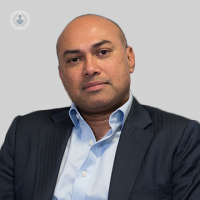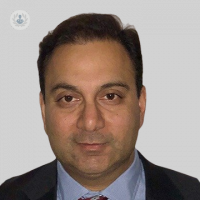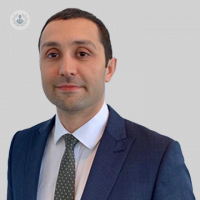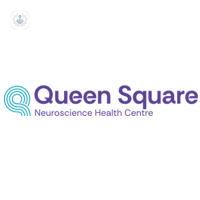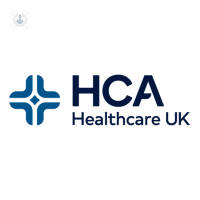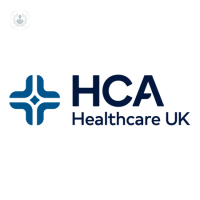What is oesophageal cancer?
Oesophageal cancer is a type of cancer that affects the oesophagus (gullet or food pipe), which is the long tube that carries food from the throat to the stomach. It occurs when abnormal cells grow in an uncontrollable way. It is more common in people in their 60s and 70s and occurs in men more than women.
What are the symptoms of oesophageal cancer?
The symptoms of oesophageal cancer include:
- Difficulty in swallowing (dysphagia) – this feels like a pain or burning sensation in the throat or chest.
- Indigestion – occurs when acid from the stomach goes back into the oesophagus.
- Heartburn – which is a burning chest pain after eating.
- Weight loss – follows as a result of not being able to eat food because of the pain.
- Pain in the throat - and behind the breastbone
- A persistent cough
- Dark poo – faeces may be almost black if the oesophagus bleeds from cancer.
What are the causes of oesophageal cancer?
The exact cause is unknown but persistent gastro-oesophageal reflux disease (GORD), smoking, excessive alcohol, being overweight and having an unhealthy diet are risk factors for the disease.
How is oesophageal cancer diagnosed?
The cancer is diagnosed using an endoscopy, which allows the doctor to see inside the oesophagus. The small, thin tube with a camera and light on the end is passed into the mouth and down towards the stomach. Sample tissues are removed so that they can be checked under a microscope. The other test used is a barium swallow, where the white liquid is swallowed and X-rays are taken. The barium highlights the lining of the oesophagus so it can show whether there is anything blocking the oesophagus.
What are the treatments for oesophageal cancer?
The treatment plan for oesophageal cancer depends on where in the oesophagus the cancer is and how big it is. It depends on whether the cancer has spread anywhere else in the body and on the patient’s general health.
If it is diagnosed during an early stage, it may be possible to cure it with the surgical removal of the affected area of the oesophagus. Chemotherapy kills the cancerous cells and shrinks the tumour.
If the cancer is diagnosed at a later stage, the cure is not achievable but surgery, chemotherapy and radiotherapy can be used to keep cancer under control and relieve symptoms.
What’s the outlook for oesophageal cancer?
The outlook depends on the stage of oesophageal cancer. It depends on how far the disease has spread, the age and the general health of the patient.
Рак пищевода
What is oesophageal cancer?
Oesophageal cancer is a type of cancer that affects the oesophagus (gullet or food pipe), which is the long tube that carries food from the throat to the stomach. It occurs when abnormal cells grow in an uncontrollable way. It is more common in people in their 60s and 70s and occurs in men more than women.
What are the symptoms of oesophageal cancer?
The symptoms of oesophageal cancer include:
- Difficulty in swallowing (dysphagia) – this feels like a pain or burning sensation in the throat or chest.
- Indigestion – occurs when acid from the stomach goes back into the oesophagus.
- Heartburn – which is a burning chest pain after eating.
- Weight loss – follows as a result of not being able to eat food because of the pain.
- Pain in the throat - and behind the breastbone
- A persistent cough
- Dark poo – faeces may be almost black if the oesophagus bleeds from cancer.
What are the causes of oesophageal cancer?
The exact cause is unknown but persistent gastro-oesophageal reflux disease (GORD), smoking, excessive alcohol, being overweight and having an unhealthy diet are risk factors for the disease.
How is oesophageal cancer diagnosed?
The cancer is diagnosed using an endoscopy, which allows the doctor to see inside the oesophagus. The small, thin tube with a camera and light on the end is passed into the mouth and down towards the stomach. Sample tissues are removed so that they can be checked under a microscope. The other test used is a barium swallow, where the white liquid is swallowed and X-rays are taken. The barium highlights the lining of the oesophagus so it can show whether there is anything blocking the oesophagus.
What are the treatments for oesophageal cancer?
The treatment plan for oesophageal cancer depends on where in the oesophagus the cancer is and how big it is. It depends on whether the cancer has spread anywhere else in the body and on the patient’s general health.
If it is diagnosed during an early stage, it may be possible to cure it with the surgical removal of the affected area of the oesophagus. Chemotherapy kills the cancerous cells and shrinks the tumour.
If the cancer is diagnosed at a later stage, the cure is not achievable but surgery, chemotherapy and radiotherapy can be used to keep cancer under control and relieve symptoms.
What’s the outlook for oesophageal cancer?
The outlook depends on the stage of oesophageal cancer. It depends on how far the disease has spread, the age and the general health of the patient.
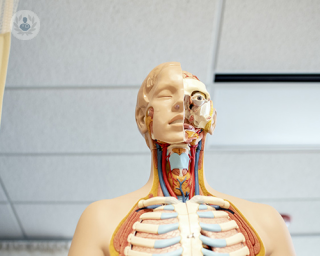

Oesophageal cancer: early signs and survival rate
Por Mr Krishna Moorthy
2024-12-29
Persistent acid reflux is a risk factor in developing oesophageal cancer. We've asked one of our top surgeons Mr Krishna Moorthy to explain the early signs of the disease, the survival rate and whether it is curable. подробнее


Oesophageal cancer: Your questions answered
Por Dr Sameer Zar
2024-12-28
In the UK, more than 9,200 people are diagnosed with oesophageal cancer each year, which is a cancer that causes extreme difficulty when it comes to swallowing food and even liquids. Here, renowned consultant gastroenterologist Dr Sameer Zar provides an expert insight into oesophageal cancer, including what changes the cancer causes in the body, and how the cancer is diagnosed and treated. подробнее


Understanding GI tract cancers: Diagnosis to treatment
Por Dr Cheng Boon
2024-12-27
The intricate network of the gastrointestinal (GI) tract, responsible for digestion and nutrient absorption, is susceptible to a spectrum of cancers. These malignancies can arise anywhere along the GI tract, from the oesophagus to the rectum, presenting diverse challenges in diagnosis and management. Understanding the nuances of GI tract cancers, including their types, symptoms, risk factors, and treatment modalities, is paramount for effective intervention and improved outcomes. подробнее


Oesophageal cancer how curable treatment options
Por Professor Bijendra Patel
2024-12-27
In the UK, approximately 8,200 people get diagnosed with oesophagal cancer every year. Although that figure isn't as high as other types of cancer, experts have seen a gradual increase in cases, especially in the west. So, what's causing this rise? Prof Bijendra Patel, one of our top upper GI and laparoscopic surgeons from London, explains what causes oesophagal cancer and how it's treated. подробнее
Врачи-специалисты в области Рак пищевода

Amethyst: The Queen Square Neuroscience Health Centre
Amethyst: The Queen Square Neuroscience Health Centre
42-43 Queen Square London WC1N 3AQ
No existe teléfono en el centro.
Si haces uso de este teléfono facilitado por TOP DOCTORS nos autorizas al tratamiento de tu teléfono para fines estadísticos y comerciales. Para más información, lee nuestra Политика конфиденциальности
Top Doctors

The Harborne Hospital - part of HCA Healthcare
The Harborne Hospital - part of HCA Healthcare
Mindelsohn Way, B15 2FQ
No existe teléfono en el centro.
Si haces uso de este teléfono facilitado por TOP DOCTORS nos autorizas al tratamiento de tu teléfono para fines estadísticos y comerciales. Para más información, lee nuestra Политика конфиденциальности
Top Doctors

The Harley Street Clinic - part of HCA Healthcare
The Harley Street Clinic - part of HCA Healthcare
35 Weymouth Street, London. W1G 8BJ
No existe teléfono en el centro.
Si haces uso de este teléfono facilitado por TOP DOCTORS nos autorizas al tratamiento de tu teléfono para fines estadísticos y comerciales. Para más información, lee nuestra Политика конфиденциальности
Top Doctors
-
Amethyst: The Queen Square Neuroscience Health Centre
42-43 Queen Square London WC1N 3AQ, Central LondonЭксперт в области :
- Ангиология и сосудистая хирургия
- Боли онкологического происхождения
- Нейрохирургия
- Неврология
- Терапевтическая онкология
- Лечение рака
-
The Harborne Hospital - part of HCA Healthcare
Mindelsohn Way, B15 2FQ, BirminghamЭксперт в области :
- Гастроэнтерология
- рак
- ортопедическая хирургия
- Хирургия грудной клетки
- Диагностика при помощи визуализации
- Акушерство и гинекология
-
The Harley Street Clinic - part of HCA Healthcare
35 Weymouth Street, London. W1G 8BJ, Central LondonЭксперт в области :
- рак
- Рак головы и шеи
- Кардиология
- Интенсивная терапия
- Диагностика при помощи визуализации
- Женское здоровье
- See more

